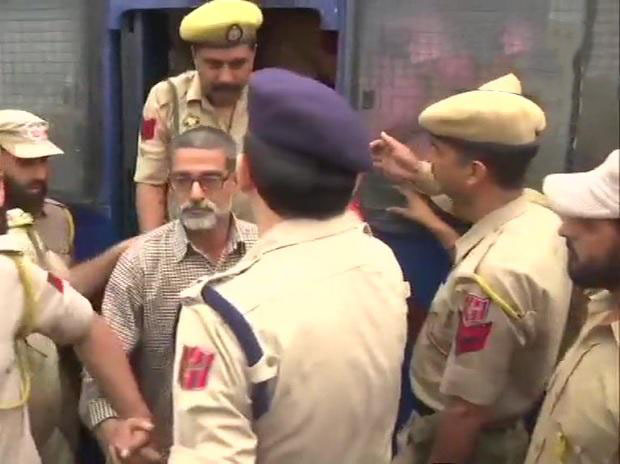Kathua accused plead not guilty, ask for narco test
Eight people accused of raping and killing an eight-year-old pleaded not guilty and asked the judge for a narco analysis test as the trial into the case, which has become the focal point of outrage across India.

Kathua: The eight people accused of raping and killing an eight-year-old pleaded not guilty and asked the judge for a narco analysis test as the trial into the case, which has become the focal point of outrage across India, began on Monday.
Seven of the eight accused were produced before District and Sessions Judge Sanjay Gupta, who asked the Jammu and Kashmir crime branch to give them copies of the chargesheet and fixed April 28 as the next date of hearing.
The eighth accused is a juvenile who moved a bail application before the chief judicial magistrate. The matter was posted for April 26.
Also Read: BJP turned his former polling agent 'communal', says Azad
The child from a minority nomadic community was allegedly held in captivity in a small village temple in Kathua district of the northern Indian state of Jammu and Kashmir for a week in January this year during which she was kept sedated and sexually assaulted before being bludgeoned to death.
According to the chargesheets filed by the Crime Branch, the abduction, rape and killing of the girl was part of a carefully planned strategy to remove the nomadic community from the area. A separate chargesheet was filed for the juvenile.
The counsel for the accused demanded a copy of the chargesheet filed by the Crime Branch on April 9 before the chief judicial magistrate.
Immediately after the brief hearing in the sessions court, the seven accused were shifted back to the jail under heavy security.
Also Read |
Kathua rape: SC issues notice to J-K govt on habeas corpus petition
Special police officer Deepak Khajuria, who is alleged to have repeatedly raped the child, told reporters from the police van that he was also demanding a a narco test, also known as the "truth test", and a CBI probe.
As the trial began inside the court, main accused Sanji Ram's daughter Madhu Sharma protested outside, demanding a CBI probe.
There was heavy police presence at the Kathua complex following the tension on April 9 when members of the local bar association did not allow the Crime Branch to submit its chargesheet in the case.
Also Read: Farooq Abdullah calls for mandatory death penalty in Kathua like case
Sanji Ram, the caretaker of the 'devisthan' in a village in Kathua, about 90 km from Jammu, is listed as the main conspirator behind the crime.
He was allegedly joined by special police officers Deepak Khajuria and Surender Verma, friend Parvesh Kumar alias Mannu, Ram's nephew, a juvenile, and his son Vishal Jangotra alias "Shamma".
The chargesheet also names investigating officers head constable Tilak Raj and Sub-Inspector Anand Dutta, who allegedly took Rs 4 lakh from Ram and destroyed crucial evidence.
The issue of providing the accused copies of the "challan", or the chargesheet, was raised before the judge by the lawyers, Ankush Sharma, who is pleading the case for Sanji Ram, his son and others, told reporters.
Also Read |
Man held for raping 3-year-old in J&K's Kathua, confesses to crime
Also Read: Meenakshi Lekhi- Opposition 'communalising' Kathua, Unnao rape incidents
He said the chargesheet was presented in court on April 9 but copies had not yet been provided.
Ram told the judge that they wanted narco tests and were ready for them.
The judge asked the accused whether they had been given copies of the chargesheet, which runs into 400 pages, added A K Sawahney, who is representing head constable Tilak Raj.
Also Read: J&K CM Mehbooba to ask for fast track court in Kathua rape
He told reporters that Jammu and Kashmir Chief Minister Mehbooba Mufti had been talking about a fast track trial but copies of the chargesheet had still not been provided to them.
In a narco analysis test, the subject is injected with sodium pentothal or sodium amytal. The dose is dependent on the person's sex, age, health and physical condition.
It does not have any legal sanctity as evidence until a court gives permission to conduct these tests. The test only helps as corroborative and not as primary evidence, say legal experts. (PTI)
 Dynamite News
Dynamite News 